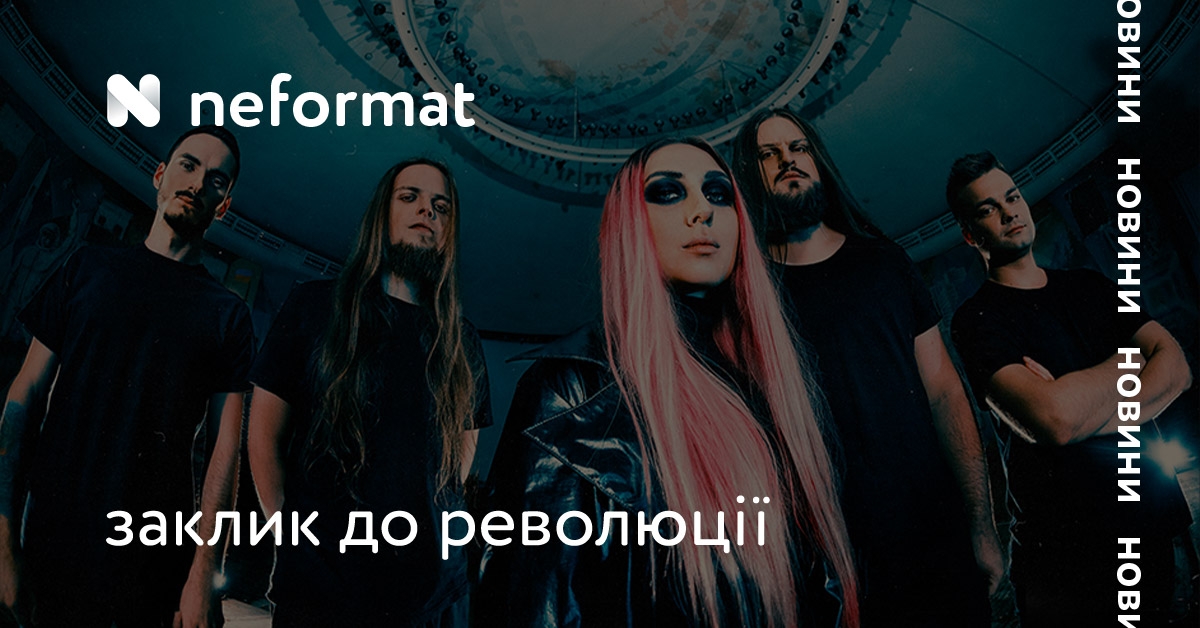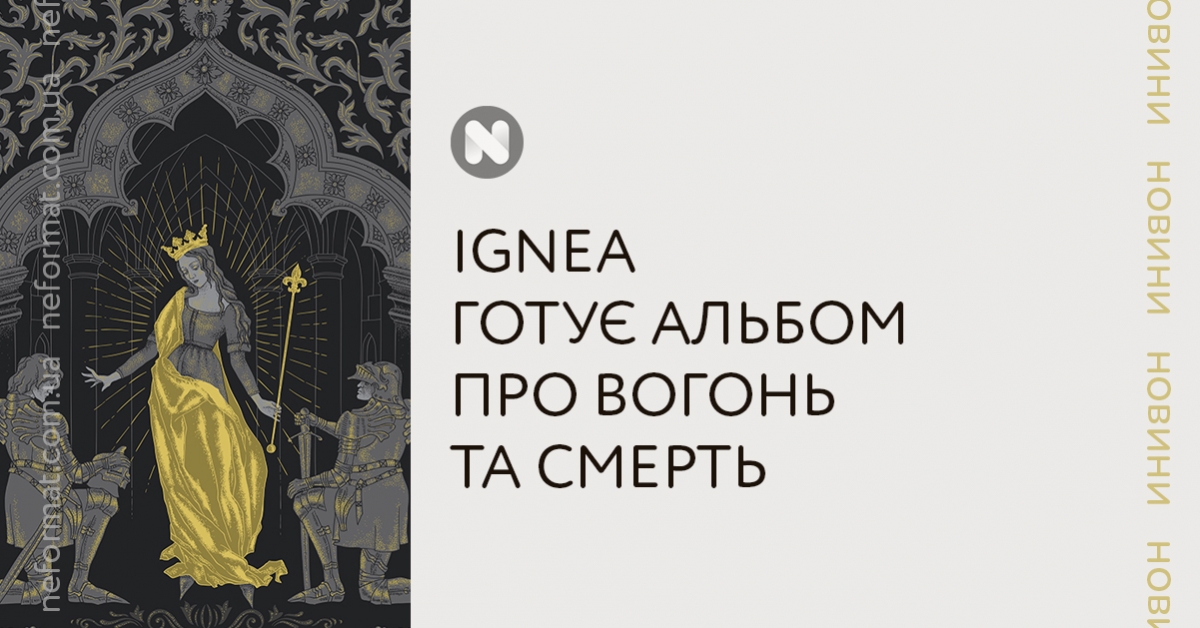Creative path of the Ukrainian frontwomen

Today, five girls namely Lera Guevska, Tetyana Yankovska, Anya Lipatova, Maria Teplytska and Helle Bogdanova, will tell us about their way to the stage and think a little about how and whether their gender influenced this process.
I think most readers of this article will be able to name a dozen "female-fronted"* projects without Google, but some did not even think about whether there is a certain gender imbalance on the stage [* hereinafter, this term used solely for convenience, but in no case as the name of a musical genre]. However, if you read the editorial column of Yaryna Denysiuk, it is difficult to disagree that the girls in the Ukrainian underground is much less than men. In addition, I analyzed the Ukrainian music albums released in 2019: the sample consisted of 200 releases, of which only 35 were female vocalists, which is 17.5% of the total (this figure is even a little overstated, as I emphasized it was for vocalists and removed from the list of ~ 25 instrumental performers). In any case, even such approximate statistics help to see the overall picture.
While preparing this material, I talked to several striking Ukrainian female vocalists to explore their path to the role of frontwoman. I deliberately did not ask some specific questions, but asked to tell a little about their creative path and why they became who they are now, and to reflect a little on the topic of gender imbalance in the Ukrainian underground scene.
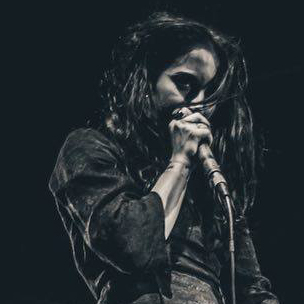
In general, I wanted to sing the blues or something like that, but a little wrong wrote the word "blues" in the request and came out "rock". When I was a child running with a microphone, I was focused on interviewing, not singing (so the choice of journalism faculty was obvious). In general, I did not think at that time that I would be introduced to music.
Once, when I was 16, my first love said that I have a good voice and it is good to sing. (I then walk and sang The Doors "Light my fire"). It really inspired me, and I started singing everywhere and always.
One day my friends and I were in the Odesa club "Shkaf", I was sitting on the stairs at the entrance and sang to Rihanna and Lady Gaga. The art director of the club approached me, said that I had a good voice and asked if I would like to sing on an open microphone. This inspired me once again and I started to prepare. I still remember a classmate who had a piano school behind, coming to me, and she and I were rehearsing my performance. I sang either 3 or 4 times on an open microphone…
A few months later, I formed my first band. There were three of us: me, my classmate as drummer and his friend as guitar player. Of course, we tried to play something like The White Stripes. I don't remember how it all ended. It seems that the guitarist liked me more than he should have, and I somehow "slowed down" the whole thing. In addition, it was not at all clear what we were doing.
Then I met the guys from the Odesa band Hollow Sun (later renamed Temple of The Universe). We all lived "in the area" and often hung out together. They invited me to a rehearsal, again someone said that I had a good voice, well, I finally believed it. During rehearsals, the guys chopped up a real stoner rock with a blues, and I thought "OH! OHH!". Several times I sang to them at jams and was very, very ashamed.
Well, after that, a few months later, the first lineup of Mother Witch was formed * [*On June 18, 2020, the band announced the reduction of the name from Mother Witch & Dead Water Ghosts]. For a year we played in the basement - more for ourselves. Until a certain "picture" began to emerge. Then we recorded the first album with one take right at the rehearsal, released it and a month later played our first concert at a distillery. And in a week - on Electric Meadow. (ed. International Psychedelic Rock Music Festival in Galicia).
To be honest, I didn't think about "gender inequality" on stage to formulate an opinion now. However, I think it is better to start by defining the context and the concept of "gender inequality" to avoid certain misunderstandings.
If we talk only about the quantitative ratio, I think there are many factors involved: the historically formed "skew", when there were fewer women performers in heavy music, and the general situation with the underground and any "informal" music in Ukraine. The big stage is full of women and even more than men. And, in fact, this may still be due to personal preferences / context / origins / environment / etc. in each person.
Many of our generation have heard from parents various statements on the topic: "You are a girl, ugh, how can you listen to that? What music? It's not serious." And the rest in various versions, in the context of heavy music.
I think that those who were less affected by the "meteorite" of the above guidelines, and who also had a desire to make music - and came directly to the stage (speaking of the underground and the Ukrainian scene). I coped with it perfectly!
In addition, many girls are in the same music community and play an important role: they write lyrics on music portals, take photos at concerts and shoot videos, make covers and posters. After all, just go to events and it is cool!
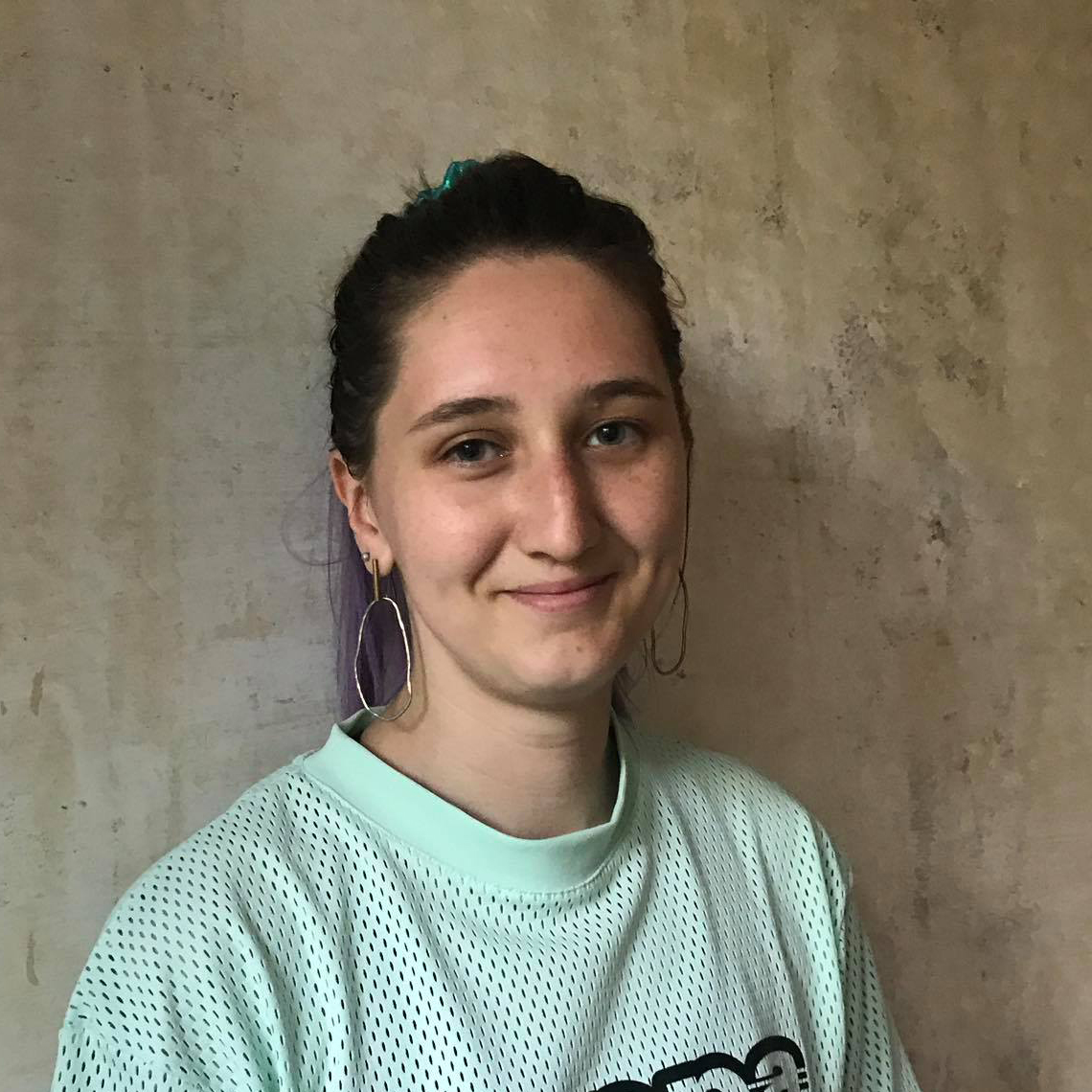
It seems to me that we all want attention, recognition and respect, so we choose different types of realization: either through career, or through creativity, or through motherhood. Or we mix everything with everything.
As for me – first I learned to play the guitar and had no special plans at the age of 15, I was not going to become a vocalist either, and in general, it was not clear what to do with my plans for life. I am very grateful to my parents, who never told me what was a woman's business and what was not, I was lucky here. I sang in the choir almost from the first grade, so I could sing and hear music. I don't remember why started singing in ai laika! most of the songs (because Nastya and Lucy also sing and their parts create the atmosphere of a punk choir that distinguishes our music). I don't like being the center of attention as a vocalist, but I like playing the guitar and playing for someone turned out to be an interesting experience and a kind of therapy.
The interesting thing here is that there are many, if not more, female musicians in pop music and on the big stage. The situation is different in the underground. I think it's a matter of educating and expecting society from girls: you have to study well, then go to college, then go to work, well, give birth to a baby, and as two – it is better. Somewhere between all this things, to be beautiful, well-groomed, feminine, cute, quiet, beautiful, slender, with a haircut, to listen to men and the male script, but not always have the opportunity to express your opinion. Because the driving woman is "ha-ha", because the woman-leader is "hysterical", because the woman-mother is "a boring bee and sits at home". Oh, stereotypes! A woman must make more effort than a man to become visible in any field. And the point, honestly, is not in professionalism at all. I say this from my own work experience and from the experience of my colleagues from different professional fields. According to research, girls study harder than boys because (back to point A): parents and society expect this from you. But the guys become the leaders, because "it's not a woman's business to run a ship". In addition, a woman is not expected to go to a high-paying job, because, you see, she does not need to support a family, and in general, women come to work to find a husband. LOOOL! We do not always have a role model to follow and learn.
And now, after all this (matriarchal, as some people think very wrongly) Ukrainian context, we return to music. Once, even from a normal and adequate guy, I heard that "you are loved because you are girls with guitars". And not a word about the music. Probably a lot of years have passed since then, but I think there are still such people. What is conditional-girl music and what is it for a guy to listen to it, well, because there is conditional-boy music. And there is a boyish movement, where, often, you have only one role: a musician’s girlfriend. This was the case 10-15 years ago and, moreover, also, judging by the documentary photos of the KIEV UNDERGROUND 1986–1995.
I think when there is more diversity in a scene, when the scene is inclusive, it ceases to be aggressive. And the underground for me is about that: about choice, honesty, inclusion. When there is more visibility of women in society and more visibility of their contribution to the development of society, we, other women, have more choices. Including that after work and care of the child, to go with a heavy guitar and a pedalboard to rehearsal.
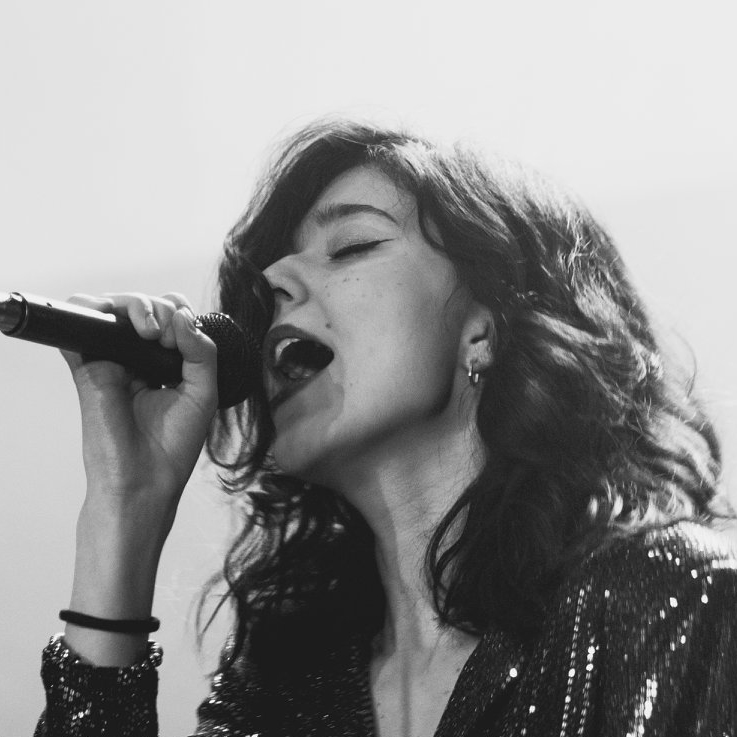
I can thank my parents for becoming a vocalist and musician. First, there have always been music instruments in our house, my parents are very musical, my father plays the guitar and my mother sings well. She used to record songs for herself at the studio (she is not a professional singer, these were recordings of covers purely for herself) and I also recorded with her, it was a Soviet song "Облака белогривые лошадки" ("Clouds of White-maned Horses"). I generally love this record; my children's vocals are much cleaner, without clamps. Then my mother "worked" as my manager and, in short, from 7-8 years to 15 I performed at literally every event at school. These were often English songs that my mother and I practiced for hours. She chose really good compositions for me, there was also the fact that we translated the song from English for the performance together only because we liked it (I was in high spirits, no coercion), and my dad sponsored musical instruments, clothes for the performances and in every way supported me. Once he even started posting my performances on YouTube (they can even be found there), of course, there are few views, but I felt parents proud of me.
For history, it should be noted that I was sent to music school for piano, which I tearfully graduated from.
Somewhere in the age of 14 I was already planning how to promote myself, I had a YouTube channel and public in VK with covers, plans to write my own chamber songs (one author's song was even written and released), and someday, when I grow up, I can put together a band, and Maaaybe someone will even want to play in it. And here, a gift from the universe! In the summer camp, I envy the guys who tell me that they play rock, and after the change they invite me to it. It was a coincidence - I just played songs on the ukulele, they just heard me, it just so happened that we live close together and we have a similar musical taste. It might not have been me at all and not the fact that it would have been worse, but I think I was lucky. And here I was not alone with big plans for the future; there were already four of us! Wow!
I want to think more about gender. In my opinion, as long as sexism exists at all levels from politics to everyday life, it will also exist in music. The indie scene is not a vacuum in which all centuries-old traditions of considering a woman weaker disappear, in which a woman can forget about how her parents raised her, all the times when she heard "you're a girl", etc.
I can't speak for guys, but once I heard a phrase from a female friend that she "does not listen to songs with female vocals, like - it sucks" (hello, brought up by society misogyny), and as a child I had enough to google once as "to sing so that everyone likes it", in the first paragraph to see the conclusion that all great singers were men, so you have to be a man, and decide: "well, I will try, but I have little chance, ha-ha". He, even in "progressive" Hollywood, a woman has fewer lines on the screen (I conclude from the analysis of last year's film).
Women were given the right to vote only a hundred years ago, so it is simply illogical to expect drastic changes in the level of perception of women by ordinary people. From scientists to music - the gender difference is getting smaller every year, so let's just wait!)

So, how I became a musician. Well, then, as a child, I liked Irina Bilyk and the band Oasis (yes, it was a long time ago) and I wanted to write songs. Then there were a few weird and a few perfectly normal bands that I played with, and now it's my solo project.
Unfortunately, I didn't have to play with girls, although I always wanted to. But somehow there were no like-minded girls. I used to try to engage my music friends, but usually they thought it was complicated, they couldn't do it and so on. But now, it seems, the girls are braver and without such complexes, it's cool.
In general, I think girls in the underground are less not because of any obstacles or prejudices, but rather because of a lack of self-belief. There are actually not enough female role models, which could be compared to. Yet.
Although there is a prejudice, especially from old sound directors)) "Yes, what do you understand there, I'll tell you right now" :) - it was like that. So you have to be ready to stand up for yourself. And well, they once wrote to me on YouTube: "Who bought you all this equipment? Who promotes you? What daddy pays for it all?" )))) However, these are single cases, in general, girls in music, I would say, have a significant advantage - if you play an instrument (even very so-so), you are already cool in the eyes of many. So girls, be brave!
There are more women on the stage now than 7 years ago. But in general, I think there is still a stereotype that this is the male sphere. And to embark on this path is like confronting guys. And it's not very comfortable psychologically. I think that about 90 percent of listeners are positive, for girls-musicians - rather, there is a certain "block in the head". But it is necessary to increase the armor to criticism, that's a fact.
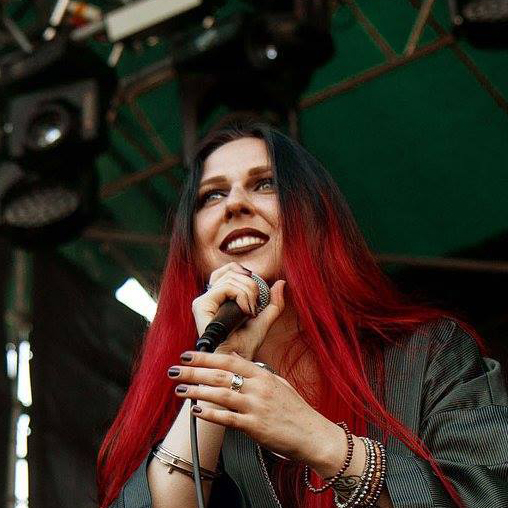
My way to vocals was really long, but I liked to sing from diapers. In kindergarten, I knew all the poems, all the songs, all the parties, my own and other children. When I was 6, I really wanted to play the piano. But my parents were not happy about it, because they wanted to raise a serious and successful girl, so they chose tutors for me from English, German, and all that. At the age of 14, I finished them off, but they gave me an ultimatum: either a guitar or a violin. Because the piano is big and expensive, it takes a long time to study, it is unknown whether I will give it up in 2 months. In the end, I agreed to the guitar and even graduated from classical guitar music school. There we had various lessons, including a choir. I hated the choir because I wanted to play, not sing (I now understand how much it would help me as a vocalist and musician in general, as well as the solfeggio I skipped). The choir was only required for one year, and then I happily dropped out. When I leave, the teacher from the choir really shed a tear with the words "who will sing for me now").
In high school I started to get a little hooked on rock / metal and then really just started to form my musical taste. And even though I was already listening to music with such normal extreme vocals, it never occurred to me to try it, because I was a guitarist. After entering Mohylyanka (ed. The Univercity "Kyiv-Mohyla Academy"), for the first few years we often met for guitar gatherings, where I played, but I was constantly asked to sing something somewhere. Then there were attempts by a rock band with classmates, where I played the electric guitar, but also started singing. Only then did I meet Zhenya, our keyboardist, who asked me to record backing vocals for a song for his band. And for a year I went to Germany to volunteer, because once at university I felt that somehow everything was wrong, and I'm not doing that. I have to think about what to do next. I was not looking for any musical adventures there, they found me itselves. There was a band that mostly just played covers for themselves. It consisted of two Germans, a Syrian and a Belarusian. And they needed a vocalist. In short, I sang with them for about 7 months. And that's where my extreme vocal attempts began. There weren't any tutorials on YouTube at that time, so the attempts were like that. I was wheezing, screaming, and doing everything I couldn't do.
At the time, I also often indulged in very homely and lo-fi recordings of various song covers, mostly guitar. I had an old netbook (!) With a shitty recording soft. There was a limit for recording - 1 minute)) So then I made something from these under-tracks, upload in VK, and very often people wrote that they really, really like my timbre. By the way, I collected the best of those cavers and uploaded it out at Patreon last year.
After my return, I became a Parallax vocalist (that was the name of IGNEA at the time). Zhenya did not have any serious intentions with the band, but I heard the potential in the songs, and began to push everyone. Rehearsals, recording, and all that. I'm very grateful to our sound producer Morton for having the strength to mess with us inexperienced, because now I understand how mediocre I was in terms of vocals. I had a timbre, I had some background, but I really didn't have any experience of recording, my voice was not enough for a long time, it floated, well, all that. Moreover, on the first EP I recorded only pure vocals + backing vocals.
Then I gradually became interested in the technique of vocals, YouTube began to pump in terms of various videos from vocal teachers, rehearsals became more, I growled more, and for the second album was already more prepared. Although, I remember very well how I cried after our first concert. It was in Bingo on Halloween Horror Night, we performed there, people liked it, and then I looked at a video on the cellphone and realized that I didn't get into 80% of the notes. I cried all day. Of course, with each concert it was better and better, and when I got ear monitor, my world changed completely. I know that some vocalists can sing from muscle memory without it, but it's not about me.
After the second album, we really grew a fan base, we started touring Europe, and just learned to perform, I improved my vocals, tried to go to some vocal teachers, but somehow it didn't work out for a long time. I've always had a lot of work over the years, and vocal lessons have receded.
In recent years, IGNEA and Patreon have taken up more and more of my time. Currently, it is somewhere around 85%. That's why I'm starting to sing more and develop as a vocalist, which can't help but make me happy. About a year and a half ago, I came to Alex Shelest, a well-known Ukrainian vocal coach. We immediately found a common language, and thanks to him, I pumped up my vocals a lot. I can't say that I constantly take lessons from him, mainly because of financial moments. But I can say that in one lesson he gives so much information that sometimes I need weeks just to digest and grind it. Alex also has a YouTube channel, and I know he sells recordings of his webinars, so I highly recommend it. He also instilled in me an interest in the structure of the vocal apparatus, because I hadn't even thought about it before. As the sound is formed, where vocal cords are, where to resist, and all that.
I came to the recording of the last album "The Realms of Fire and Death" the most prepared. This time, I recorded demos for all the tracks at home, pumped during tours and classes. Despite the fact that I had a terrible allergy when we recorded this album, I was still twice as enduring during the recording, the range increased, and the technique improved.
I have been asked several times if I give vocal lessons, and I have been invited to some workshops to hold master classes. I always refuse because I still have a lot to learn. Besides, I'm not a vocal coach, and some things I can do in terms of vocals, but to explain correctly - no. That's why I would bypass such self-made vocal teachers on the tenth road, because you can just break your voice forever. The only thing I plan to do on the same Patreon or maybe on my YouTube channel is a video about some of my routine in terms of vocal health or a selection of resources that help me develop as a vocalist. I'm working on it now, so if you're interested, follow the news. Leaving aside my idea that gender is basically irrelevant when it comes to an activity or music, I would say so. I didn't count statistically and I don't look at the music market geographically, but more globally. And globally, there have been a lot of rock / metal bands with female vocalists, and it seems to me that scales will soon turn the other way. Maybe in Ukraine we are just a little behind all this, simply because we have a demand for another music genre. I would say we are well and qualitatively represented in the genres played by The Hardkiss, Onuka, [O], Vivienne Mort, and note… All these bands have a frontwoman.
In general, I think we just don't need to worry about that. Today, girls are not harassed in rock-metal genres for sure. Showbiz is a bit different, I will not speak for it. But I'm just trying to explain that if we look at gender statistics and emphasize that there are fewer girls, we get to know what's going on in the world of cinema, where they try to cram all genders and races into every film so as not to offend anyone. In my opinion, it is necessary to choose on skills.
Conclusion
Although our society is evolving, historically the roles of women and men in it are somewhat different. Many Ukrainians still believe, that the main "function" of a woman is procreation, family, and everything else is purely male affairs. Even when hiring, a woman can often hear questions about her marital status and whether she plans to have a child and go on maternity leave. I think you will agree that it is primitive, but we have what we have.
After analyzing the stories in this article, we see that one way or another all the girls were influenced by their parents or close associates, who did not drive them into a certain "standard framework" and did not stick labels from the "you're a girl" series, but allowed freedom of choice and gave their support. Society in general and the stage in particular are evolving, certain role models and role models are emerging. Who knows, maybe these stories will inspire some of the readers, help to overcome fears and embark on a difficult musical path? I do not encourage girls to give up everything and become musicians to create a gender balance on stage, but I ask you to stop being afraid, move away from stereotypes and do what is important and interesting for you.
It will be reminded that several researches on the role of women on the music scene have already been conducted on the neformat portal, in particular Yaryna Denysiuk and Mykola Maga dealt with gender issues in Ukrainian hip-hop "Rap and Gender: How Ukrainian Girls MC Live", and Yegor Felyust conducted a more global study of the role of women on the music scene in general through the prism of the history of world music.
Photos by Jurgen MetalPhotography, Zhenya Bondarenko, Olha Androsova,
Iryna Yankovska, Gera Suslikova







